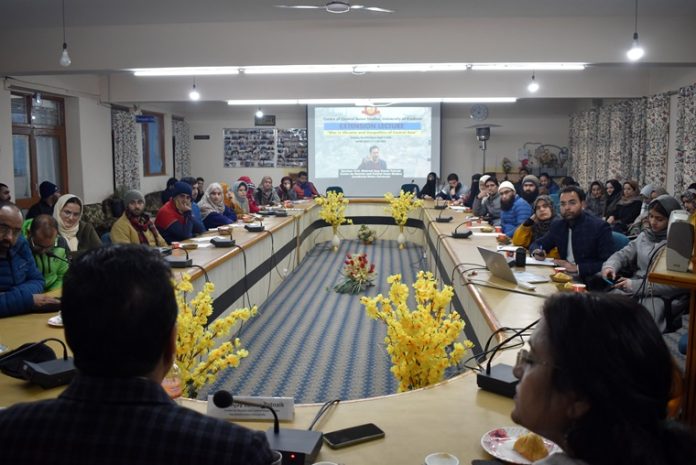SRINAGAR: An extension lecture was on Thursday organised by Centre of Central Asian Studies (CCAS), University of Kashmir.
Prof Ajay Kumar Patnaik, former Director of UGC’s Area Study Programme on Russia and Central Asia, delivered the lecture on ‘War in Ukraine and Geopolitics of Central Asia’.
Prof Tabasum Firdous, Director CCAS, introduced the guest speaker and highlighted his contribution to CCAS including extension lectures, mentorship to scholars and recognition of the Centre at national and international levels.
The lecture was attended by faculty members and scholars of the CCAS and a few other departments.
Prof Patnaik, former Chairperson of Centre for Russian and Central Asian Studies at School of International Studies, JNU, argued that there are “more important aspects of the Ukraine War that are not evident in the mainstream media which generally centers around Russia’s offensive in Ukraine.”
“But there is more to the story than these simplistic assumptions and judgments. Much of this seeming propaganda has to do with West’s anxiety about Russia being the most powerful nuke state at the moment. The West has put much effort to induce market economy in Russia, ever since the fall of the USSR, even before that,” he said, adding: “Despite this fall, the West pumped many resources into consolidating and expanding NATO, especially in 1997 (Eastwards, towards the Russian border). During these exercises, it was made sure that NATO has a commanding position near the Russian borders, primarily by co-opting the erstwhile USSR constituent parts.”
Moreover, the West also wanted to dominate the Eurasian quarters, considered the heartland of the region primarily because of its oil resources, Prof Patnaik said.
“This ‘new containment game’ began rather slowly. Nevertheless, post-Soviet states developed nationalistic tendencies, and bolster the demographic attributes. The internal politics in the Central Asian Republics began to reflect the anxieties associated with the Soviets. The nationalism discourse within these republics is directed against the Russian minorities,” he said.
The session ended with a question-answer session.


